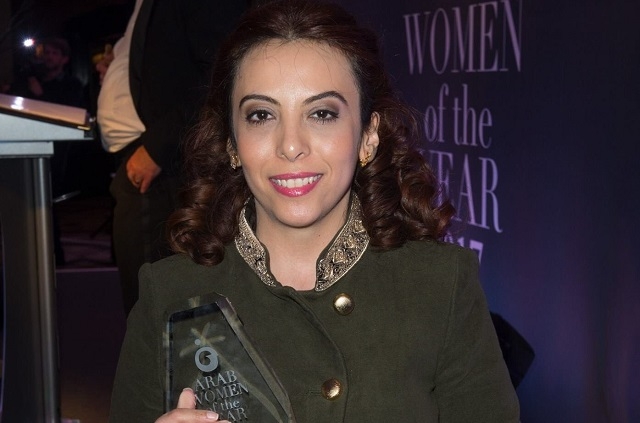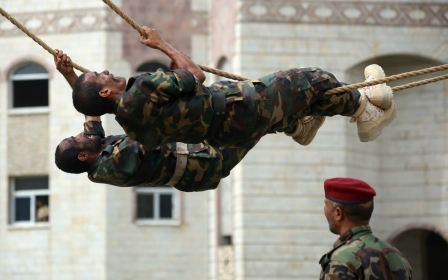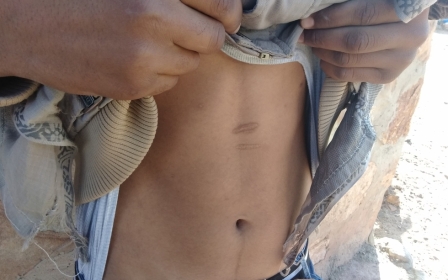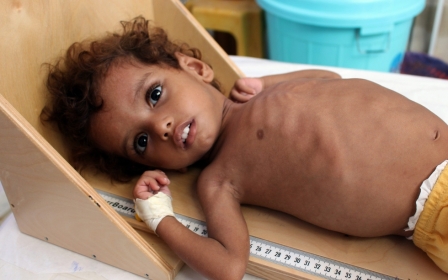Yemeni women rights' advocate fears deportation from Sweden

Swedish immigration authorities have denied a Yemeni journalist and her teenage daughter refugee status despite the "serious security risks" they could face if deported.
Hind Aleryani, an award-winning Yemeni journalist and social activist, now risks deportation from Sweden, where her mother and sister are based and where her teenage daughter is attending school.
A devastated Aleryani spoke to Middle East Eye on Thursday about her ordeal, breaking her silence after more than a year trying to obtain the right to stay in Sweden where she says she feels most safe.
Before seeking asylum in Sweden in September 2017, Aleryani lived in Turkey for many years, where she worked as a radio journalist for the Arabic-language Radio Monte Carlo Douliya.
Aleryani’s asylum application was last rejected by a Swedish court in June. She has since been living under the fear of deportation or arrest by police.
For Aleryani, Sweden has provided the safest home for herself and her traumatised daughter, who has been hospitalised several times since arriving in Sweden due to anxiety over the uncertainty of her life and the death threats they received while living in Turkey.
The reason cited by Swedish authorities to justify their decision to deny her asylum is that she has a Schengen visa obtained from the Czech Republic. To be eligible to seek asylum in Sweden, according to the Dublin Regulation, Aleryani’s case should be heard in the Czech Republic, the country where she first travelled with her visa.
Aleryani's daughter, however, obtained her visa from Sweden.
Although her mother and sister were granted asylum in Sweden after the outbreak of the conflict in Yemen, she had not initially applied for refugee status due to her wish to continue to travel abroad advocating for peace in Yemen as part of her work with the UN. Because asylum applicants are not allowed to travel abroad while their case is examined, she decided to stay in Turkey instead with her Yemeni passport.
Aleryani’s criticism of radical religious discourse regarding women in Yemen has elicited attacks against her by conservative public figures and clerics, which she said have led to many death threats directed at her and her daughter by Yemenis who accused her of blasphemy. She no longer felt safe in Turkey.
Aleryani was a recipient of the 2017 Arab Women of the Year award in public awareness.
“As a journalist, I write things that anger some people,” she told MEE.
In one of her statements, she had condemned Yemeni MP Abdullah al-Adaini for suggesting that the way young women dress leads to their rape following reports of the rape of a three-year-old girl in the capital Sanaa.
“The only place for such a man would be in a prison cell in countries that respect human rights,” she said in a Facebook post. “The people of Taiz should arrest him for justifying the rape of children."
She said she received death threats from Yemeni Facebook users following her statements.
Aleryani is a member of the Yemeni Women’s Pact for Peace and Security, an initiative supported by the UN Women organisation and funded by the Dutch and British governments, with the stated goals of ending violence, improving living conditions and amplifying women’s inclusion in the peace process.
Most recently, her writings denouncing Abdelwahab Al-Humaiqani, a Salafi politician and cleric now exiled in Saudi Arabia, for his radical views on women have triggered a tirade by a Houthi-run Yemeni TV channel, accusing her of being funded by international organisations to “defame Islam” - accusations which Aleryani denies.
In a Facebook post, cleric Humayqani said that the hijab (the Muslim women’s headscarf) should not be obligatory for “ugly women” and the elderly.
In response, Aleryani posted a picture of herself on Facebook without the hijab, with caption: “Ugly and proud.”
Following the TV programme, Aleryani received calls from anonymous Yemenis threatening to go after her 16-year-old daughter, mentioning the name of her school to further intimidate her. Fearing for her daughter's safety, she immediately travelled to Sweden, leaving all her belongings behind.
“Extremists from different ideologies agree only when it comes to women’s issues,” she said.
Iyad El-Baghdady, a Palestinian writer and human rights activist who lives in Norway, described Aleryani as “an independent woman hunted by religious fanatics and by dictators”.
Human rights advocates launched a campaign in solidarity with Aleryani, with the hashtag HindNotaNumber, calling on the Swedish government to expedite her asylum process.
Reporters without Borders (RSF), an international NGO that defends press freedom, wrote a letter to Swedish authorities in support of Aleryani.
In the letter, seen by MEE, RSF urged Sweden to grant her asylum.
“We are convinced that Ms Eryani could be exposed to serious security risks if she had to return to Yemen and we therefore support her request for protection,” a RSF official wrote.
Yemen is ranked 167th out of 180 countries in RSF’s 2018 World Press Freedom Index.
When contacted by MEE, the Swedish Migration Agency declined to discuss Aleryani's case with the media.
New MEE newsletter: Jerusalem Dispatch
Sign up to get the latest insights and analysis on Israel-Palestine, alongside Turkey Unpacked and other MEE newsletters
Middle East Eye delivers independent and unrivalled coverage and analysis of the Middle East, North Africa and beyond. To learn more about republishing this content and the associated fees, please fill out this form. More about MEE can be found here.




